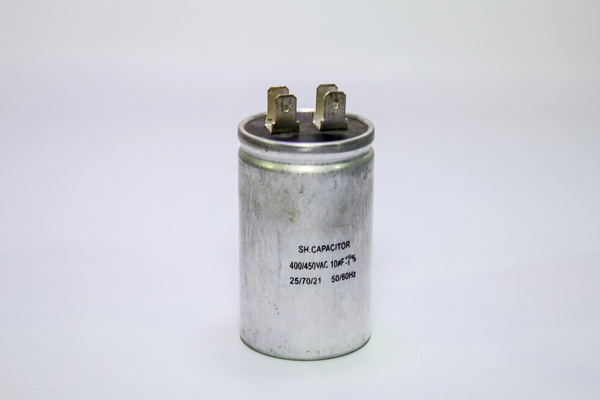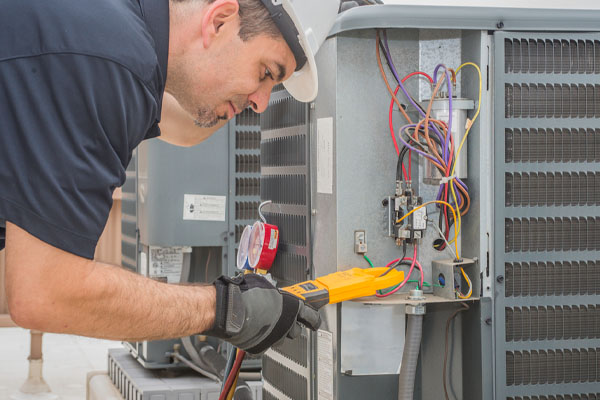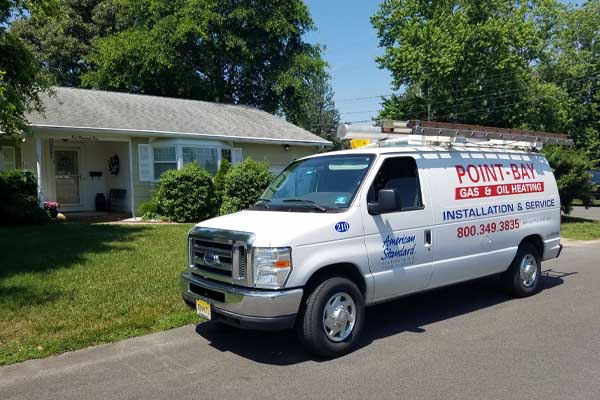
Air conditioner capacitors are crucial in the proper functioning of your air conditioner. While they may be small in size, these electrical parts have a significant impact on the air conditioner’s overall performance. Learning what AC capacitors are and why they are essential is crucial for both homeowners and HVAC enthusiasts.
This article discusses the AC capacitors’ role, function, and importance. This includes the various types, common signs of capacitor problems, and why capacitors are important in maintaining efficient home cooling. When you are knowledgeable about capacitors, you are better equipped to identify and address the potential problems they may have. This way, you are sure your air conditioner has optimal performance and longevity.
The Air Conditioner Capacitors’ Function
An air conditioner capacitor is a cleverly designed device made of two metal conductors that is separated by an insulating material. When it comes to air conditioners, capacitors are usually recognizable as big, cylindrical batteries that have two or three posts sticking out of the top.
The air conditioner capacitor is vital in powering the system’s motors, allowing it to cool your home effectively. This small but crucial part typically needs replacing because it tends to malfunction or fail.
An air conditioner capacitor that stops working can translate to a disruption in your HVAC system’s operations. This results in your air conditioner struggling to distribute cold air, increasing the strain on the unit and potentially spiking your home’s energy costs. When you understand why the air conditioner capacitor is important, you can address any issues immediately. This way, you will have efficient home cooling while preventing unnecessary expenditures.
Related Article: How To Prevent Your Air Conditioner From Freezing Up
Why Is An Air Conditioner Capacitor Important?

The primary role of an air conditioner capacitor is to store and release electrical energy to power the motors, ensuring the air conditioner functions properly. Turning on the cooling system leads to the capacitor providing a jolt of electricity to start the motors. This allows the motors to spin and run the compressor and fan. It is a temporary source of power, supplying the needed energy for the initial AC motor startup.
The air conditioner is crucial as the motors will have difficulty starting or may not start at all without it. A faulty capacitor can result in issues like an air conditioner not turning on, the compressor repeatedly cycling on and off, or weak HVAC airflow. A failed capacitor may even cause the air conditioner system to stop working. Therefore, the capacitor’s proper function is vital to the air conditioner‘s overall performance and efficiency. Regular HVAC maintenance and prompt capacitor replacement when needed can help maintain optimal performance and prevent potential breakdowns.
Related Article: When to Call Emergency HVAC Services
Why AC Capacitors Fail Or Malfunction
Air conditioner capacitors can malfunction or fail because of different reasons, such as:
- Age and Wear: Capacitors will eventually deteriorate, weaken, and lose their ability to hold a charge. The internal parts of capacitors may degrade over time, causing reduced capacitance and eventual failure.
- Overheating: Normal operation means capacitors are exposed to heat. However, excess heat can lead to overheating and faster degradation of capacitors. High temperatures can cause the internal parts and insulation to break down faster, causing capacitor failure.
- Voltage Fluctuations: Capacitors can become stressed and fail from rapid voltage fluctuations or power surges. Lightning strikes, power outages, and electrical spikes can disrupt the normal capacitor function and cause failure.
- Manufacturing Defects: Sometimes, capacitors become prone to premature failure because of manufacturing defects. These defects can be from incorrect assembly, poor quality materials, or insufficient testing during the manufacturing process.
- Excessive Electrical Load: The capacitors can become strained if the air conditioner is under heavy electrical loads, like running in extreme weather conditions or operating for long periods. This can eventually cause failure.
- Environmental Factors: Harsh environmental conditions, like exposure to dust, humidity, moisture, or corrosive chemicals, can impact the capacitors’ lifespan and performance. These factors can lead to insulation breakdown, corrosion, or short circuits within the capacitor.
Regular air conditioner maintenance, including capacitor checkups and testing, can help determine possible issues before they cause complete failure. A malfunctioning capacitor may show signs of leaking, bulging, or having a burnt smell. It should be replaced as soon as possible to prevent further damage to the air conditioner.
Related Article: What is a High-Velocity Mini Duct Air Conditioning System?
Signs Of A Bad Air Conditioning Capacitor

Here are several signs of a bad air conditioning capacitor:
- Weak or No Cold Air: A faulty capacitor can result in your air conditioner to blow warm air instead of cold air or have a weak airflow. The capacitor is vital in powering the motors that drive the cooling process, so a defective capacitor can cause inadequate cooling.
- Difficulty Starting: A failing capacitor can result in your air conditioner struggling during startup. It may take longer than normal for the system to kick in, or the unit may repeatedly try to start but fail to do so.
- Frequent Cycling: A capacitor that’s nearly failing may result in the air conditioning unit cycling on and off more often than usual. This rapid cycling can increase wear and tear and stress the system.
- Humming or Buzzing Sounds: Odd sounds like buzzing or humming from your air conditioner can indicate a capacitor problem. Malfunctioning capacitors can result in electrical disturbances that present themselves as strange noises.
- Capacitor Bulging or Leaking: Bulging or swelling in capacitors is a physical sign it is bad. Severe cases may result in the capacitor leaking or showing signs of burning or charring. These physical signs indicate a defective or compromised capacitor requiring immediate replacement.
- Tripped Breaker: A faulty capacitor can cause excess electrical currents, tripping the circuit breaker. It is worth checking the capacitor as a possible culprit if your air conditioner repeatedly causes the breaker to trip.
Related Article: Why Are My Lights Flickering When My AC Turns On?
Call A Professional HVAC Contractor – Don’t Conduct A DIY Air Conditioner Capacitor Repair

Here are some reasons it is crucial to contact a professional HVAC contractor if your air conditioner fails or malfunctions:
- Safety: It can be dangerous to work with electrical parts, especially if you don’t have the necessary training, experience, and knowledge. Capacitors store electrical energy even when the power is disconnected. Therefore, mishandling them can cause electrical shocks or injuries. HVAC technicians are trained to handle capacitors safely.
- Proper Diagnosis: A faulty capacitor may be one of the potential reasons behind air conditioner problems. However, other underlying problems can also be the cause. HVAC professionals are equipped with the expertise to correctly diagnose the problem and find out if the capacitor is the cause or if other problems contribute to the air conditioner malfunction.
- Correct Air Conditioner Capacitor Replacement: Capacitors have many different sizes, capacitance values, and voltage ratings. Choosing incorrectly can cause improper functioning or further damage to your air conditioner. HVAC technicians know how to determine the right capacitor and ensure correct installation so there are no further complications.
- HVAC Warranty Considerations: If your air conditioner is under warranty, trying to repair or replace the parts yourself may void your warranty. HVAC professionals have the needed certifications and knowledge to repair without risking your warranty coverage.
- Air Conditioner Efficiency & Performance: Air conditioners are complex equipment with different parts working together to provide optimal cooling performance. An HVAC technician can assess the whole system, not just the capacitor. They will ensure all parts are working correctly so the air conditioner’s efficiency, cooling capacity, and overall performance are optimized.
Related Article: The Importance Of Home Air Sealing Your Home On Energy Costs
Conclusion
In general, calling a professional HVAC technician ensures that repairing or replacing the air conditioner capacitor is done correctly, safely, and in consideration of the complete system. It helps protect your investment by keeping your warranty coverage intact and ensuring your air conditioner operates efficiently and reliably.
Related Article: 10 Reasons Why Your AC Unit Isn’t Blowing Cool Air
Give Point Bay Fuel A Call For All Your HVAC Needs

When you need high-quality HVAC services in Ocean County and Monmouth County, New Jersey, call Point Bay Fuel. We have the best professionally certified technicians who are experts in exceptional HVAC installations, replacements, repairs, and tune-ups. All our techs have the skills, experience, and knowledge to service your HVAC system correctly and safely.
Point Bay Fuel guarantees the most competitive heating and cooling service costs in the region. Our maintenance services can help increase your home’s energy efficiency and comfort while lowering your cooling costs. If you require a repair or replacement of your HVAC system, we can recommend the best one for your unique situation within your budget. All our work is guaranteed. Call Point Bay Fuel to schedule a service appointment. We offer free, in-home estimates.
Contact us now by calling (732) 349-5059 to speak to one of our home comfort specialists! Click the link to view our service area.
The post Air Conditioner Capacitors: What They Are & Why They Are Important appeared first on Point Bay Fuel.
No comments:
Post a Comment